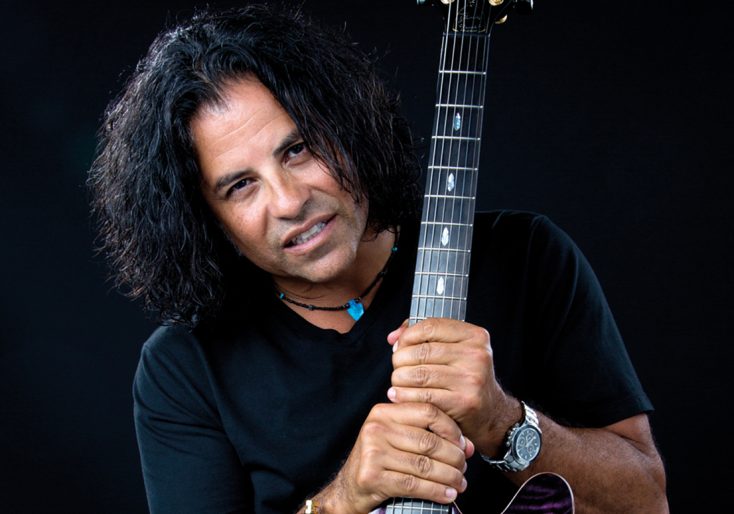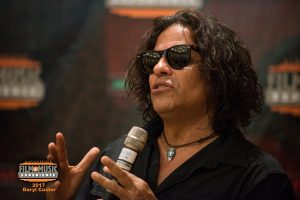By LYNN BARKER
Front Row Features
ALBUQUERQUE, N.M.—“I’m a fan first. I still feel like a kid,” says 52-year-old rock guitarist, music producer, writer, composer and now film producer Stevie Salas at the Albuquerque Film and Music Experience, where he was presented the 2017 Visionary Award.
Salas is co-executive producer of the Sundance Film Festival 2017 award-winning documentary “Rumble: The Indians Who Rocked the World,” which opened the AFME and will get its nationwide theatrical release this summer.
A world-renowned guitarist, the rocker has performed with Mick Jagger, Rod Stewart, Justin Timberlake, George Clinton and many others. As a composer, Salas has scored several films including “Bill & Ted’s Excellent Adventure” and Uwe Boll’s 2009 film “Darfur.” From 2006 to 2010, Salas served as the music director and a consultant for “American Idol,” supporting Kris Allen, Adam Lambert, Chris Daughtry, and their touring bands.
A Native American, Salas co-created a Smithsonian Institution exhibit called “Up Where We Belong: Native Musicians in Popular Culture” which inspired his “Rumble” doc tracing the indigenous people’s involvement in American music, from the Delta blues and jazz eras up to present-day hip hop. Icons with Native American roots including Charley Patton, Mildred Bailey, Link Wray, Jimi Hendrix, Jesse Ed Davis, Buffy Sainte-Marie, Robbie Robertson and others are honored in the film.
Q: You’ve played with some of the greats. Did you have to adjust your style for each artist’s sound?
Salas: I didn’t want to be the guy who fit in in a band. I wanted to be the guy who stood out but you don’t show up to play with Mick Jagger dressed in a red boa with a giant Sly and the Family Stone hat on. You need to research to understand each artist you will play with. You can’t step all over their artistry.
Q: How did you get started?
Salas: In 1985 I was homeless, sleeping in a friend’s walk-in closet and on a couch (at a recording studio). I’d go up to bands and say that I played guitar and got (varying reactions). I did that with George Clinton and he said, “Really? Okay.” He had a guitar player working with him at 3 a.m. He was looking for something new so I went in and went bananas, and I stayed. I got my first $212 session check from Capitol Records shortly after. When I listen to what I do, I think it’s horrible. That was my first break. George Clinton discovered me and when I was (with him), everybody thought I was some high-powered guitar player from Detroit.
Q: “Rumble: The Indians Who Rocked the World” is getting great buzz. Where does it go from here?
Salas: The film turned out better than expected so it’s kind of exploding now. It’s getting its theatrical release starting July 26th in New York City, then into Toronto and across Canada, Los Angeles in August and on from there.
Q: Who is featured in the film?
Salas: A lot of my Native American musician friends would call me (upset) because they’re not in the film. But, it’s about this small group of people who happened to be Native American who influenced everything we know as rock ‘n roll. You listen to Jeff Beck or Led Zeppelin or The Who, or The Rolling Stones (and) you’re listening to Link Wray (a Shawnee Native American rocker guitarist in the ‘50’s).
(Guns ‘N Roses guitarist) Slash told me he was wondering how did Jeff Beck, Jimmy Page, Pete Townsend and Eric Clapton know how to play? They didn’t just come from nowhere. I was listening to those guys. Everything came back to Link Wray. We wanted to show that Native Americans influenced rock ‘n roll history. (Canadian musician) Robbie Robertson too.
Q: Were you concerned that the film might start a war about which culture started what in the music industry?
Salas: Well, I can’t take credit for the story. The director, Catherine Bainbridge, is a real historian. I more focused on what I know from the years of traveling the world, playing Madison Square Garden and huge stadiums with my friends. I worried more about the entertainment side. Catherine dug deep into the music history, and she managed to do a great job without insulting anyone. I didn’t want to have a negative vibe. I wanted it to be something positive.
Q: Didn’t blues and jazz have an African influence?
Salas: Yes, but when you really go back to the birth of the blues in the south, (you see that) the slaves and the Native Americans together created these sounds and that’s what became the blues. Variations of jazz came from that. You take the African rhythms and you put the Native American heartbeat four on the floor with that and that’s where it started. You throw in a little bit of Scottish or Irish stuff too.
Q: You worked on “American Idol.” I wouldn’t think that’s your kind of show. Was it?
Salas: About 2006, the music biz was disintegrating. “American Idol” isn’t a music show. It’s a dreams come true show. Sing a song and your life changes overnight. That’s what it’s really about. For a while everything was Jordin Sparks. She had that hit, “No Air,” but the next season nobody was talking about her. The fans weren’t married to the artist; they were married to the show. Those artists can sell 5 million records but the fans aren’t loyal to the artist, but loyal to the show.
Q: Are you going to produce more documentaries?
Salas: I don’t think so. After promoting “Rumble,” I’m interested is doing some TV and scripted feature films.






